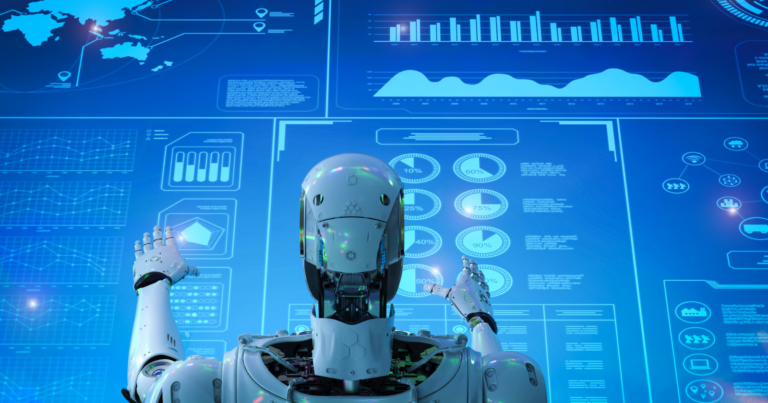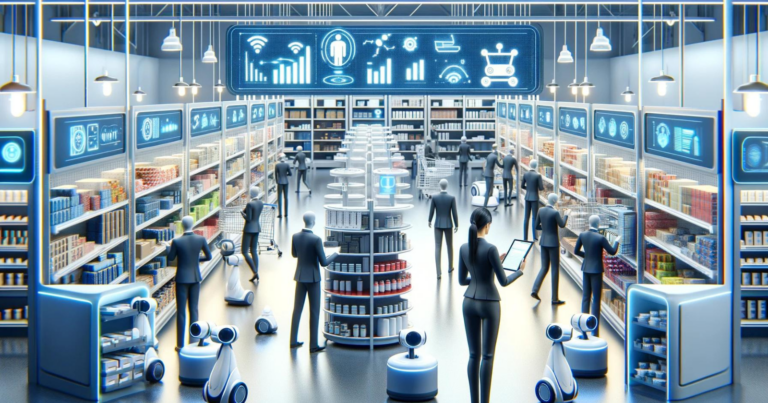AI Automation in Various Industries: Transforming Business Operations and Efficiency
Artificial intelligence is reshaping the way we work, and you might be wondering how it’s influencing your industry. But first, let’s decode this buzzword: AI is a suite of technologies enabling machines to mimic human-like decision-making and learning. Its growth has been phenomenal, and industries across the board are adopting AI to stay ahead. Have you noticed how online customer service via chat has gotten quite responsive? Chances are, you’ve been chatting with an AI!

Now, every industry has its own unique challenges, but AI seems to be the Swiss Army knife everyone is eager to wield. From streamlining manufacturing processes to automating the monotonous tasks in your office, AI is not just a tech trend; it’s a game-changer aiming to boost efficiency and spur innovation. Imagine having a tireless colleague who’s always on the ball, analyzing data and providing insights around the clock—this is what AI brings to the table.
Consider, for instance, the immense potential of AI across various industries, shaping everything from how we shop to the personalized way you’re served ads online. And let’s not overlook the potential for AI automation, which could take repetitive tasks off your plate, freeing you up to tackle the creative aspects of your job that no robot can manage. Ready to see how this exciting technology is crossing boundaries and what it means for your career? Let’s dive in and see how AI is turning the cogs in different industries!
The Impact of AI on Healthcare
Artificial intelligence (AI) is reshaping healthcare, and guess what? You’re at the center of this revolution! We’re talking about enhanced accuracy in medical diagnostics, streamlined patient care, and accelerated pharmaceutical research. It’s a game-changer for sure!
Medical Diagnostics and Imaging
Who knew computers could help save lives? Machine learning is making waves in medical diagnostics with its ability to analyze images more quickly and accurately than ever. You’ll be amazed to know that AI can detect patterns in x-rays and MRIs that even trained eyes might miss. This means faster diagnosis for diseases like cancer, often with higher correctness rates. Transforming healthcare with AI talks about AI’s front-line role in healthcare innovation.
Patient Care Automation
Imagine a world where robots do more than just vacuums! In healthcare, AI-powered systems improve productivity by handling tasks like appointment scheduling and patient follow-ups. This gives healthcare professionals more time for—you guessed it—actual patient care. Plus, AI is ready to support healthcare personnel in various clinical and administrative tasks.
Pharmaceutical Research and Development
Big Pharma, meet Big Data. AI is playing matchmaker in pharmaceutical research and development, crunching massive datasets to discover potential new drugs. This not only speeds things up but may also lower costs. For pharmaceutical companies, machine learning means finding the needle in the haystack is no longer an impossible task.
AI’s role in healthcare is already impressive and it’s getting better every day. The blend of technology, machine learning, and healthcare innovation is improving lives. The best part? It’s only the beginning!
AI in Manufacturing and Production
Hey there! Ever imagine a world where machines work alongside humans, making everything more efficient? It’s happening right now in manufacturing! Let’s dive into how AI is revolutionizing this industry, boosting productivity and spurring innovation.
Robotic Process Automation
Did you know robots are the new co-workers on the manufacturing floor? With Robotic Process Automation (RPA), they’re performing repetitive tasks, reducing errors, and working non-stop. This isn’t just about efficiency; it’s about reshaping the future of manufacturing. Robots in manufacturing automation are being widely adopted, and they’re helping companies keep up with demand without skipping a beat.
Quality Control and Predictive Maintenance
Alright, let’s talk quality control. Utilizing AI, manufacturers are now spotting product defects that the human eye might miss. It’s a game-changer in quality assurance. And there’s more: AI-driven predictive maintenance. This means using data from sensors to foresee and prevent equipment failures before they happen. Think of it as a sixth sense for your machinery—keeping downtime low and productivity high. This level of predictive maintenance is transforming how we think about the lifespan and efficiency of manufacturing equipment.
Supply Chain Optimization
Last up, we’ve got the backbone of manufacturing—the supply chain. AI is like a smart assistant, optimizing the entire process, from inventory management to logistics. With real-time data and AI analytics, manufacturers are no longer guessing but making informed decisions that straight-up boost supply chain productivity. The benefits? Lower costs and happier customers. The AI magic is making supply chains more resilient and responsive, which is crucial in today’s fast-paced market.
AI in manufacturing isn’t just about cutting-edge technology; it’s about creating a symphony where everything works in perfect harmony. Your production lines become more efficient, your quality skyrockets, and your supply chain runs smoother than ever. The age of AI automation has arrived, and it’s making things in manufacturing look pretty bright.
Artificial Intelligence in Finance
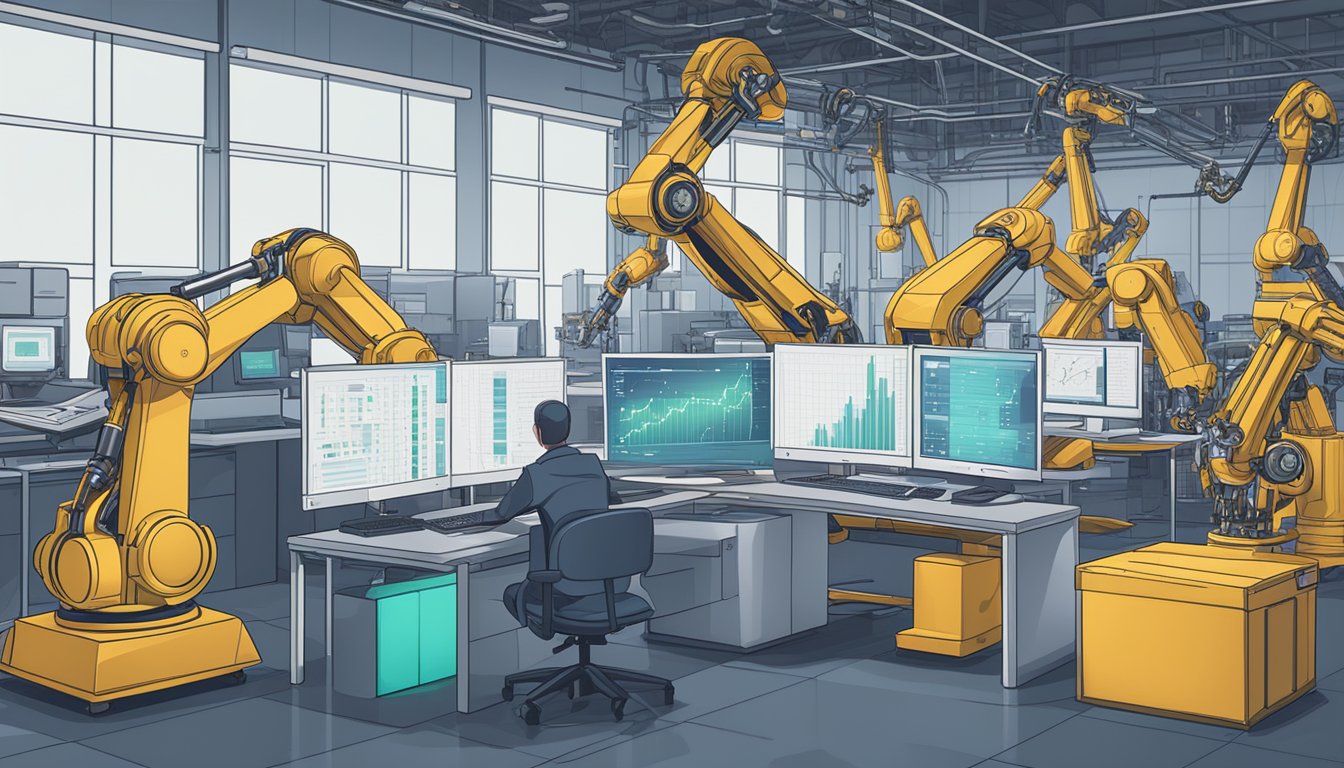
Have you ever wondered how the finance industry stays up-to-date with the ever-evolving tech world? Artificial intelligence (AI) is reshaping how financial institutions operate, from strengthening data security to personalizing your banking experience. Let’s dive in and see how AI is making waves in your wallet!
Algorithmic Trading and Investing
Algorithmic trading, ever heard of it? It’s where AI really flexes its muscles in finance! Robo-advisors are using deep learning algorithms to analyze market data at lightning speeds, making decisions about what to buy and sell faster than you can say “stock market”. These advanced systems can adapt to new information in real-time, which means they might help you maximize your investments without even breaking a sweat.
Credit Scoring and Risk Assessment
When you apply for a loan, AI is often the judge behind the scenes. Lenders are now employing sophisticated AI models to determine your creditworthiness. Unlike traditional methods that rely on a set number of criteria, these AI systems considervast arrays of data points to predict risk more accurately. This isn’t just about whether you pay your bills on time; it’s about painting a complete financial picture of you. Pretty cool, right?
Fraud Detection and Cybersecurity
No one likes to think about fraud, but AI is like a superhero fighting it behind the scenes. AI in finance is constantly on the lookout for unusual patterns that might indicate fraudulent activities. By using complex algorithms to monitor transactions, AI can flag anything fishy, keeping your money safer than ever. And it’s not just about spotting fraud—it’s also about enhancing data security to prevent it. Banks are embedding AI into their cybersecurity strategies to protect your financial data from hackers.
Remember, artificial intelligence isn’t coming—it’s already here, making your financial world smarter, safer, and more personalized. And the best part? It’s only going to get better as AI continues to learn and evolve. So, next time you’re banking or trading, give a silent thanks to AI for making your life a bit easier!
AI-Enhanced Marketing and Advertising
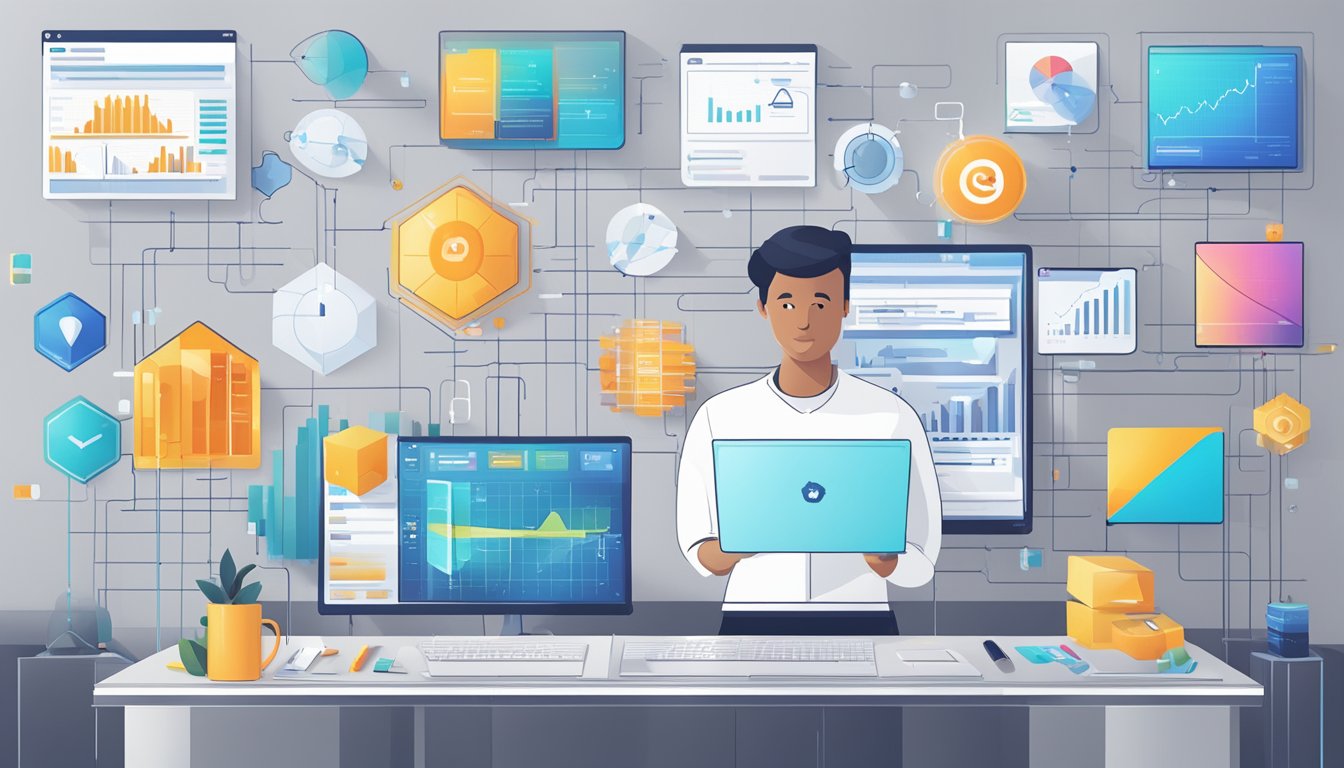
Get ready to see how AI is revolutionizing the marketing and advertising world! Think tailored shopping experiences and ads that seem to read your mind—this is the new age of consumer engagement.
Behavioral Insights through Data Analysis
Ever wonder how retailers know exactly what you want? AI analyzes vast amounts of behavioral data to predict shopping habits. By sifting through clicks, views, and past purchases, businesses craft targeted campaigns that resonate with you. Imagine a world where your go-to store always knows just what you’re looking for—it’s already here!
Personalized Customer Experiences
Personalization is the name of the game in marketing these days, all thanks to AI. From the emails landing in your inbox to the ads popping up on your social feeds, AI-powered systems ensure that your preferences take center stage. It’s no magic; it’s AI weaving its spells through CRM platforms, turning generic interactions into memorable, tailor-made experiences.
Social Media and Influencer Engagement
Social media’s buzz isn’t just about catchy hashtags or viral memes; it’s a goldmine for advertising. AI tools are on the lookout for trends and influencer impact, so businesses can ride the waves alongside your favorite online personalities. Let’s be real, who hasn’t felt the urge to buy something an influencer recommended, right?
Ready to embrace AI in your shopping journey? The algorithms are waiting to enhance your experience!
AI in Retail and E-commerce
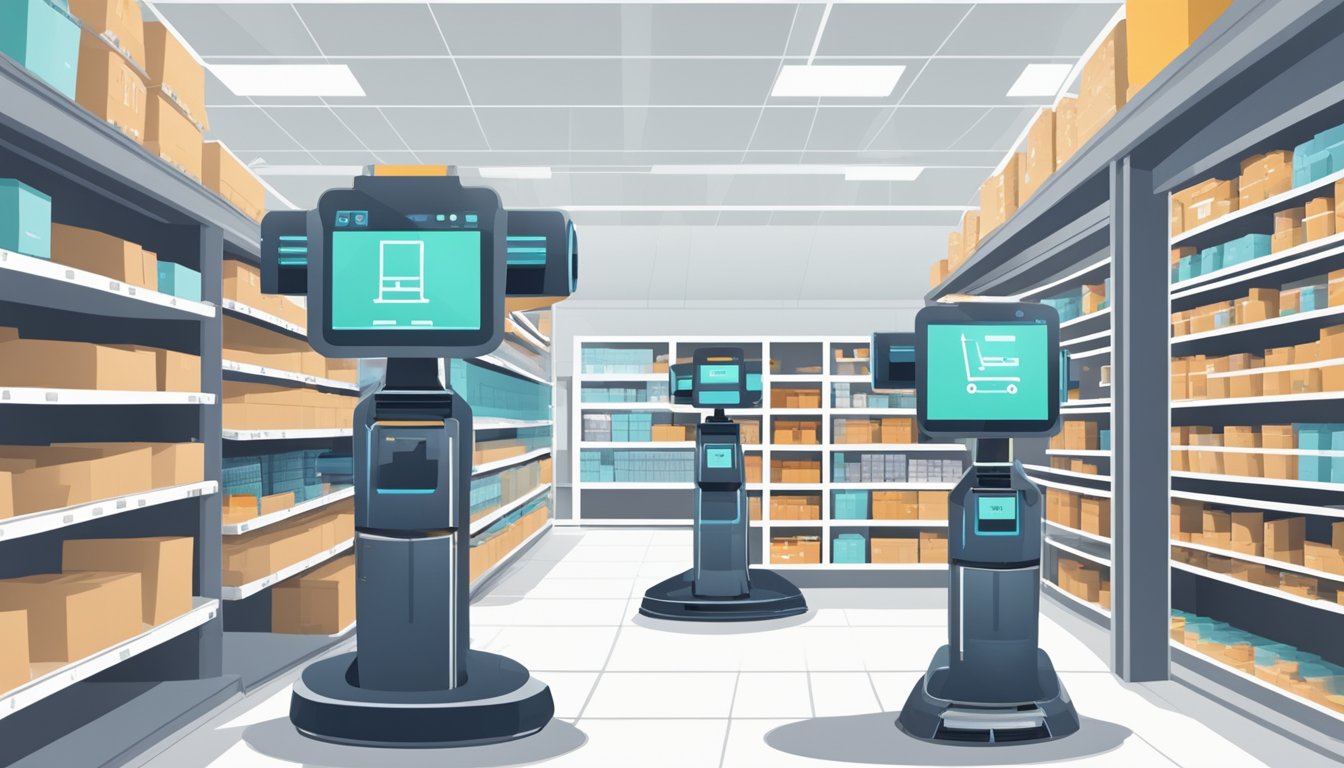
Did you know artificial intelligence is tailoring your shopping experience as we speak? That’s right, from the moment you start browsing until your items are delivered, AI is hard at work. Let’s dive right in and see just how it’s revolutionizing retail and e-commerce.
Inventory Management and Product Recommendations
Inventory Management is a game-changer in the retail space. With AI, brands are now managing stocks with incredible precision, cutting down on overstocking or understocking headaches. For instance, AI systems can predict the demand for certain products and ensure they are always available for you.
On the flip side, Product Recommendations are getting smarter. Have you ever noticed how some online stores seem to know exactly what you’ll like? That’s AI studying your shopping habits to suggest items that you’ll likely want to add to your cart. This not only boosts sales but also enhances your shopping experience by personalizing it.
- Efficiency: With reduced errors and faster operations, stores are saving time and money.
- E-commerce: Online shops are becoming more intuitive, thanks to AI’s pattern recognition.
Virtual Assistants and Chatbots
Ever chatted with a customer service representative online? Chances are, you were talking to a Chatbot. These AI-driven helpers are available 24/7, ensuring that your questions never go unanswered. From tracking orders to resolving issues, they’re the silent heroes of customer service.
Not just any chatter! These virtual assistants are constantly learning from interactions to improve their help skills, so they get better at assisting you over time. The goal? To make your online shopping as smooth as possible, without any hiccups.
Customer Behavior and Sales Analysis
Finally, understanding Customer Behavior is crucial for any business, and AI excels here. It analyzes sales data and customer feedback, helping businesses forecast trends and tailor their strategies. By doing so, stores can offer you deals and products you’re more likely to purchase.
Imagine walking into a store that understands your style and preferences, presenting you with choices that you’d probably make yourself. That’s the kind of foresight AI brings to the table in sales analysis, making each of your shopping ventures more and more like a personalized journey.
- Efficiency: Real-time analytics means real-time solutions to keep you happy.
- E-commerce: Your online browsing is no random walk; AI ensures every click counts towards a better buying experience.
From managing massive inventories to offering a helpful virtual hand, AI in retail and e-commerce is truly a match made in tech heaven. Now, isn’t it nice to have a personal shopping assistant tucked into your browser?
Educational Advancements through AI
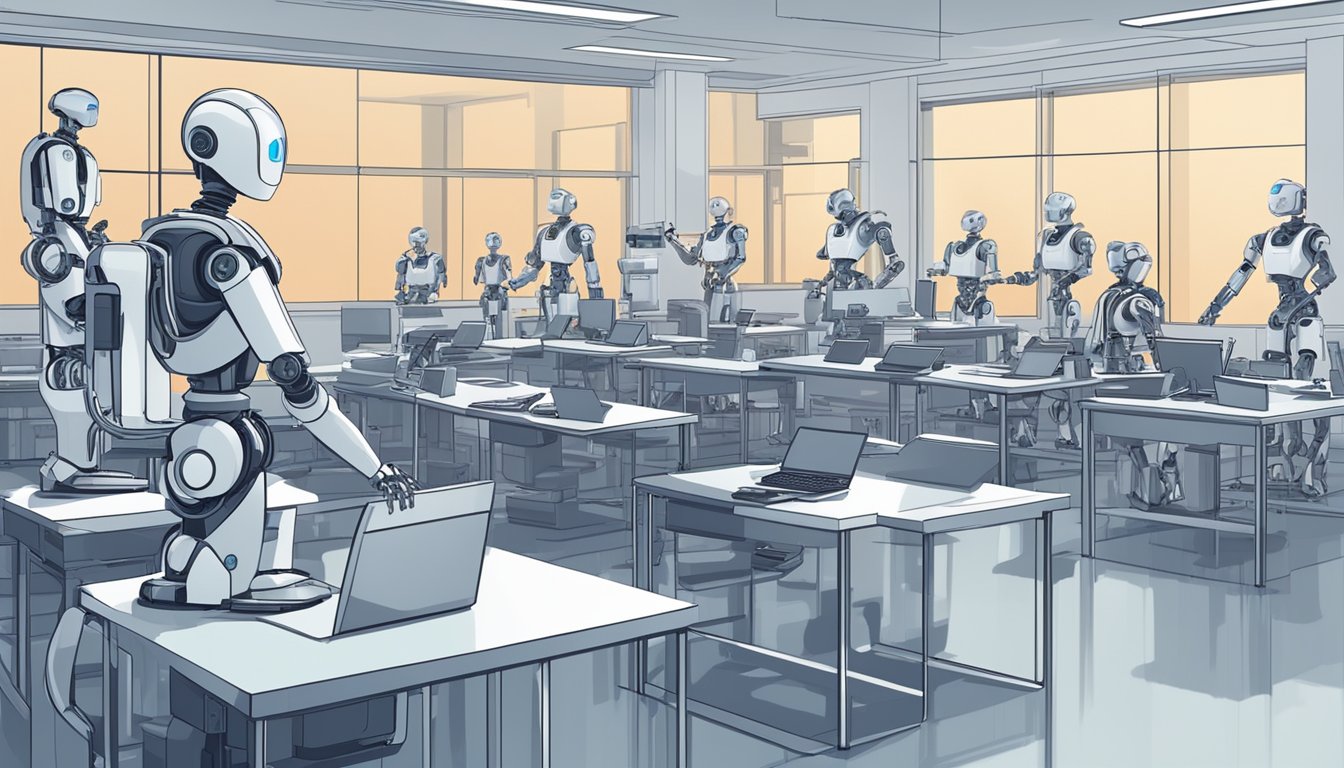
Artificial intelligence is changing the game in education, and you’re right in the middle of this transformation! The potential for AI to create personalized learning tools, provide instantaneous grading and feedback, and offer robust tutoring systems is not only exciting but also filled with tangible benefits. Let’s dive into the specifics.
Personalized Learning
Have you ever wished your study material understood your unique learning style? Machine learning, a subset of AI, is making this possible by tailoring educational content to individual student needs. Students are experiencing growth in their learning outcomes because AI systems can analyze their past performance and adapt the curriculum accordingly. For example, if you struggle with a math concept, AI can provide additional resources to help you grasp it.
Automated Grading and Feedback
Imagine the time teachers can save with AI taking over grading duties. AI can evaluate essays and short answers, delivering insight into student understanding with unprecedented speed and accuracy. Not only does it handle multiple-choice questions with ease, but advancements in natural language processing, like those seen in tools such as ChatGPT, allow for nuanced evaluation of written responses.
AI Tutoring and Support Systems
What if you had a tutor available 24/7? AI tutoring systems are offering just that. These systems use deep learning algorithms to provide personalized instruction and support. Whether you’re an early bird or a night owl, AI tutoring can adapt to your schedule, ensuring you get the help you need when you need it. It’s like having a personal coach who’s always there to encourage your educational growth.
The Ethical and Employment Challenges of AI
As we zoom into the world of AI, you’ve probably heard the buzz around how it’s changing the game in various industries. But what does that mean for you and your job? Let’s unpack the ethical quandaries and the real talk on employment.
AI and Job Displacement
Think about the last time you drove by a construction site. Did you see a crane or a bulldozer? Well, AI is like the new kid on the block, but instead of building just one house, it’s reshaping entire sectors. In the U.S., AI has already made some jobs go the way of the dodo. For instance, self-driving cars? They’re not just cool tech; they could lead to fewer cabbies in the driving seat. The big question: How do we balance this disruption and make sure people aren’t left behind?
- High-skilled Positions at Risk: Contrary to popular belief, it’s not just repetitive jobs facing the heat; it’s also the white-collars. Yes, even business professionals and legal eagles need to watch their backs.
- Industry-Specific Impact: Each industry faces its challenge—like how AI in healthcare could mean fewer routine checkups from your doc.
The Need for New Skills and Education
Ever felt like you’re in a constant race to keep up with the latest tools and hacks? Well, AI just turned that race into a sprint. As AI evolves, your skill set needs a reboot too. So let’s talk new skills and education:
- Lifelong Learning is Key: It’s not just about diplomas or degrees; ongoing learning programs are becoming the norm to stay in the game.
- Focus on Human Touch: Skills that AI can’t replace—like emotional intelligence—are becoming your new superpowers in the workspace.
Regulation and Legal Considerations
Navigating through AI’s new terrain feels a bit like the Wild West, doesn’t it? But hold your horses! Regulation and legal stuff need to catch up. Legal considerations are a labyrinth by themselves, and with AI, it’s trickier.
- Ethical Guidelines: Look out for rules on fairness and transparency to make sure AI plays nice.
- Liabilities and Responsibilities: Who’s to blame when AI makes a whoopsie? Laws are being written as we speak to sort this out.
Within these burgeoning challenges lie opportunities for growth. AI isn’t just a tech trend; it’s a catalyst that could skyrocket labor productivity if harnessed conscientiously. So, keep your eyes peeled, your mind open, and your skills sharp!
Frequently Asked Questions
Artificial intelligence is not just a futuristic concept—it’s here, transforming industries as diverse as manufacturing and customer service today. Let’s dive into some of the pressing questions you’ve been curious about.
How is AI revolutionizing efficiency in the manufacturing industry?
AI is transforming the manufacturing industry by streamlining production lines, reducing downtime through predictive maintenance, and ensuring consistent product quality. Techniques like machine learning are being leveraged to optimize processes and drastically cut operational costs.
Which sectors are seeing the biggest transformation due to AI automation?
The sectors most impacted include office and administrative support, which faces changes in tasks like data entry and scheduling. Legal services follow closely, with AI handling document review and legal research.
What are some real-world examples of AI automation across different industries?
In healthcare, AI automates patient data analysis for better diagnosis. In retail, it personalizes customer experiences, and in finance, AI tools are used for risk assessment and fraud detection. These are just snapshots of AI’s versatile capabilities across fields.
What are the primary benefits companies experience when implementing AI in their workflow?
Companies witness increased efficiency and cost savings when AI is adopted in their workflow. AI’s precision and ability to work tirelessly translate into enhanced accuracy, quality, and significant productivity gains.
Can you highlight how AI is shaping the future of the manufacturing sector?
AI not only boosts efficiency in manufacturing but also fosters innovation by enabling the creation of complex, custom products. Advanced techniques in AI such as deep learning are predicted to create significant annual value, potentially accounting for a large portion of the value produced by all analytics techniques.
What are the key ways businesses in the service sector are utilizing AI to enhance customer experiences?
Service-oriented businesses are using AI for chatbots that provide instant customer service and for analyzing customer data to tailor services. AI aids in creating predictive models that anticipate customer needs, ensuring that the service provided is always one step ahead.


